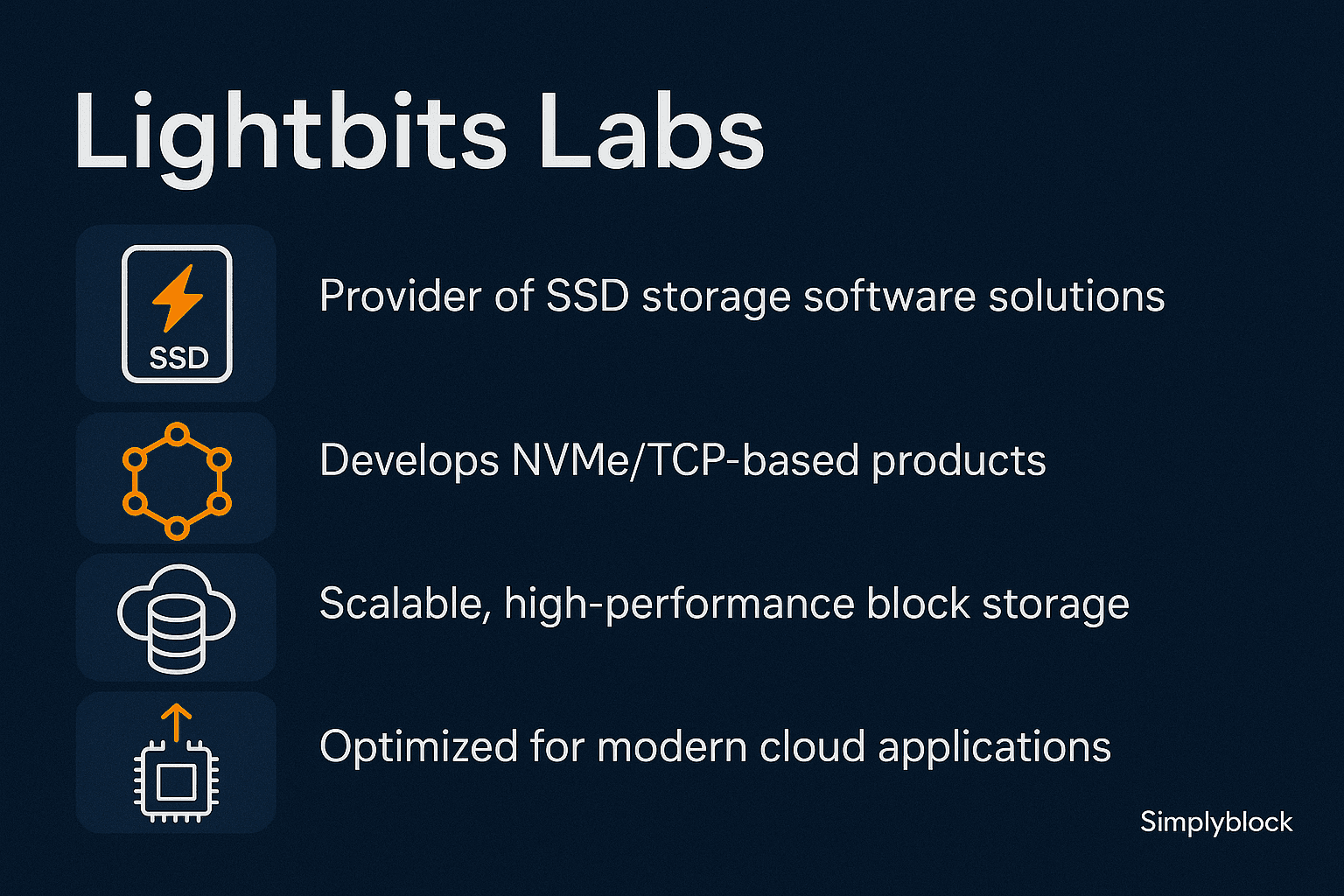What Is NVMe Storage by Lightbits?
Terms related to simplyblock
Lightbits Labs is a software-defined storage (SDS) company that delivers disaggregated block storage using the NVMe over TCP protocol. The platform allows organizations to decouple compute and storage using standard Ethernet infrastructure, achieving performance comparable to local NVMe drives without relying on specialized hardware like RDMA or Fibre Channel.
Lightbits is commonly used in private cloud, VMware, and Kubernetes environments that require low-latency, scalable, and efficient block storage. It is one of the original contributors to bringing NVMe/TCP to production in enterprise workloads.
Lightbits Labs provides a storage stack called LightOS that enables centralized NVMe-over-TCP storage services over IP networks. It allows compute nodes to connect to remote storage with near-local performance.
The platform includes data services such as inline compression, thin provisioning, replication, and high availability. It integrates with Kubernetes using a CSI driver and supports orchestration tools like OpenStack and virtualization platforms like VMware.
Unlike legacy SAN systems, Lightbits is built around NVMe/TCP, a fabric-agnostic protocol that runs efficiently over standard Ethernet. This makes it ideal for high-throughput workloads running in containerized and virtualized environments.
This page is for informational and educational purposes only. It does not imply endorsement or affiliation with any company mentioned. All information presented here is based on publicly available sources and intended for educational purposes only.
Key Features of Lightbits
Lightbits Labs offers several features designed for performance-critical infrastructure:
- NVMe-over-TCP storage access on standard Ethernet
- Disaggregated architecture decouples compute and storage
- Inline compression to reduce data footprint
- Thin provisioning for space efficiency
- Snapshots and replication for backup and disaster recovery
- Kubernetes integration via CSI for dynamic provisioning
- Compatibility with VMware and OpenStack
- Hardware-agnostic design using standard x86 servers

Architectural Models in NVMe/TCP Storage
NVMe-over-TCP can be implemented in multiple ways. Some vendors, such as Lightbits Labs, use centralized architectures that simplify management in enterprise data centers. Others adopt distributed designs, which enable scalability across hybrid and Kubernetes-native environments.
| Feature | Other Vendors | Simplyblock |
|---|---|---|
| Architecture | Single-node NVMe/TCP | Distributed NVMe/TCP (shared-everything) |
| Data Protection | RAID + replication | Distributed Erasure Coding |
| Kubernetes Integration | external CSI driver | Deploys on Kubernetes + CSI Driver |
| Cloud & Edge Support | Limited | Full hybrid, edge, and air-gapped support |
| Storage Efficiency | Thin provisioning, compression | Thin provisioning + erasure coding |
| Hardware Requirements | x86 servers | x86 or ARM |
Exploring Modern NVMe/TCP Implementations
Lightbits Labs introduced NVMe/TCP to the enterprise market and provides a solid disaggregated storage solution. Simplyblock takes this further by combining distributed architecture, erasure coding, and full Kubernetes-native integration.
Simplyblock reduces replication overhead while maintaining high availability. It also supports edge deployments, air-gapped environments, and cloud-native automation, making it ideal for teams seeking performance, resilience, and cost efficiency.
If you’re modernizing your infrastructure and need scalable block storage with advanced operational simplicity, simplyblock is a high-performance solution that provides distributed NVMe/TCP storage system designed for Kubernetes.
Lightbits®, Lightbits Labs®, and LightOS® are trademarks of Lightbits Labs, Inc. Simplyblock GmbH is not affiliated with or endorsed by Lightbits Labs, Inc. Other product and company names may be trademarks of their respective owners.
Explore more Simplyblock insights:
- NVMe over TCP vs iSCSI
- Distributed Storage Systems
- Scale-out Architecture
- Advanced Erasure Coding
- Simplyblock vs Ceph
External Resources
Questions and Answers
NVMe-over-TCP (NVMe/TCP) is a transport protocol that extends the high-performance NVMe command set over standard TCP/IP networks, enabling remote access to NVMe devices without requiring specialized fabrics. It’s important because it allows disaggregation of storage and compute, simplifying deployment and reducing costs in cloud-native and hybrid environments.
In centralized storage architectures, data and control logic are concentrated in a central control plane or array; this can simplify management but may become a bottleneck at scale. In distributed architectures, data is spread across many nodes with decentralized control, enabling higher parallelism, resilience, and scalability across regions or racks.
No. One of the advantages of NVMe/TCP is that it runs over standard Ethernet and TCP/IP — it does not require specialized hardware or lossless fabrics. However, improved network adapters, offload engines, or CPU capabilities can help boost performance in high-throughput or low-latency scenarios.
Distributed architectures generally offer greater flexibility in hybrid or cloud-native environments because they can scale independently across locations, adapt to changing workload patterns, and localize storage closer to compute or edge zones.
